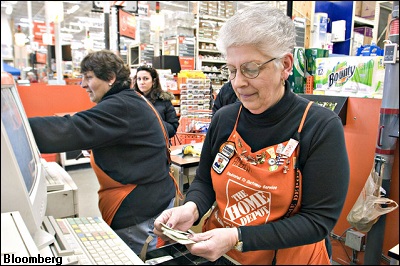
|
|

|
|
| April 27, 2024 |
|
Older workers left few options if they lose their jobs 
It’s the best – and worst – of times for older workers.
The unemployment rate for Americans 55 and older is lower than for any other age group the government tracks, and far below the national average. But if an older worker loses a job, the length of time that person will stay unemployed is typically much longer than for any other age group. “There’s a much higher prevalence of unemployment among young people, but the time that you spend in that state is much shorter,” said Linda Barrington, executive director of the Institute for Compensation Studies at Cornell University. Darrel Keesee, 61, is among those struggling to find new work. This past January, he lost a job as a package handler with a major delivery company after working there for four years. The Mesa, Ariz., resident has sent out countless resumes and kept himself busy volunteering in his community and at his church. But he says what he really wants is the satisfaction of going to a paying job every day. “It’s been difficult,” he said. Keesee said he’s been lucky in that his wife has a steady job, and for now he is still collecting unemployment. But the financial toll of this job loss, combined with several other bouts of unemployment over the past decade or so, has been significant. “After the unemployment ends I may very well have to look at losing my home, the home that we brought our kids home to,” he said. The unemployment rate for workers aged 55 and over was 5 percent in July, according to the most recent data available from the Bureau of Labor Statistics. That’s still higher than historical averages but it’s much lower than the overall unemployment rate of 7.4 percent, and below the unemployment rate for any younger group of workers. The government is scheduled to release August employment numbers on Friday, and forecasters are expecting the economy to have added around 200,000 jobs. Workers aged 55 and over also are the only ones to have seen their ranks grow substantially since 2007, the year the nation went into recession. There were 31.6 million employed people aged 55 and over in July, according to the BLS, up from 25.9 million in July of 2007. That’s partly demographics: As baby boomers age, more are becoming part of the 55-plus cohort. But workers also appear to be staying on the job longer. The average age of retirement has slowly crept up to age 61, according to a Gallup poll released earlier this year, and government data shows that the share of people working past age 65 also has been increasing. Experts say many people who are nearing traditional retirement age want to keep working, and are healthy enough to do so. But, they say, some are fighting employers’ perceptions that workers in their 50s and 60s are out of touch or not worth the investment. “The people in that age group today are in the middle of a huge transition in terms of how age is seen and experienced, and I don’t think the world has caught up with that change,” said Jacquelyn James, co-director of research at Boston College’s Sloan Center on Aging & Work. “So older workers are still seen as people who are planning for retirement, who are on their way out their door, who are disengaging.” Related: Are you considering quitting your job once health insurance is available under Obamacare? Long wait for a job That’s one of the many reasons experts say it generally takes much longer for people who are 55 or older to find a new job if they do become unemployed. The median duration of unemployment for 55- to 64-year-olds was 22.3 weeks in July, according to the Bureau of Labor Statistics. That’s far above the overall median duration of joblessness for all age groups, which was 13.8 weeks in July. “It is much more of a catastrophic (event) if you lose your job at 57, 58,” said Dean Baker, co-director of the Center for Economic and Policy Research, a left-leaning economics think tank. That’s an age when many people are at risk of falling through the cracks, because they have not yet saved enough to retire and also are too young to collect Social Security and Medicare. “You’re looking at someone who has a hell of a hard time to get re-employed and doesn’t have much to fall back on,” Baker said. Even if a person who has been out of work for a long time does find a new job, James notes that he or she might never make as much money as in the past. A Bureau of Labor Statistics analysis of men who experienced long-term unemployment found that even four years after the jobless stint they were still making less than they once had. One big, thorny problem is that some older workers simply cannot get the kind of job that they lost, because many of the well-paying jobs that once existed have been automated or outsourced. Barrington said this is one area where younger workers may have an advantage, they are less likely to have spent decades honing specialized skills, and may have more flexibility to go back to school to learn new skills. She said that’s a tougher proposition for someone who is late in their career and may not have years to retrain. The arduous job search is one big reason she said many older workers carry such anxiety about becoming unemployed. “The fear of losing your job is actually the fear of how long it will take you to get one,” Barrington said. (Source: NBC News) Story Date: September 6, 2013
|